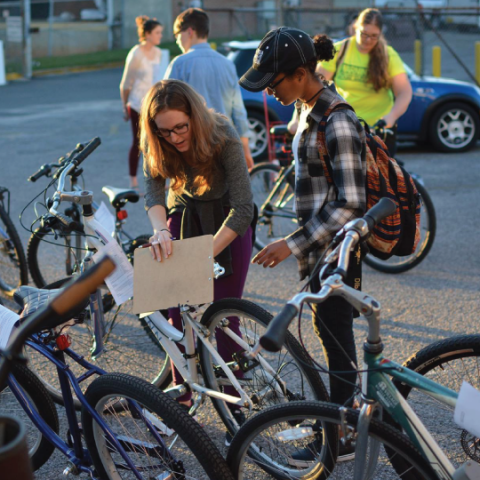A How-To Guide to Cycling in Tallahassee

Tallahassee is quite a bicycle-friendly city, especially if you are a college student. Riding a bike in town can be an excellent source of exercise, entertainment and transportation, all at once. This article is intended to provide both non-cyclists and cyclists with resources and advice in regards to bicycling in Tallahassee.
First, you will need a bike. Luckily, FSU does a lot to cater to cyclists, and we even have opportunities to rent bicycles. The FSU Re-Cycle Bike Program allows students to rent a bicycle, helmet, headlights and taillights for $60 a semester and $100 for an entire year. If you prefer to own a bicycle, University Cycles sells a wide range bikes and are located off Gaines Street. If you are able to make the trip, I personally recommend Joe’s Bike Shop on Lake Ella. Joe’s Bike Shop has the best prices in town, sells quality used bicycles and has a friendly and attentive staff willing to accommodate you. I wouldn't recommend buying a bike from someone on Craigslist unless you knew enough about bikes to determine if you are being ripped off or not.
Once you have a bike, there are a few things you should know about maintenance. FSU has bike repair stations by the Leach and on the south side of the Oglesby Union. These stations have wrenches, hex keys and other tools in addition to air pumps. However, the Union bike pump is automatic and does not work on presta valves, and the Leach pump is broken and only lets air out of your tires.
If you are having serious bike problems, you should stop by Krank It Up off Gaines Street. Krank It Up is a non-profit organization of bike mechanics that will teach you how to fix different problems you have with your bike. Krank It Up also hosts several events per year, including multiple bike races and competitive bike polo.
You should also register your bike with FSUPD, and invest in a good bike lock. Unfortunately, thieves will steal your bike if you lock it up with a cheap lock, but if the FSUPD has your bike’s serial number on record, it will be easier to recover. If you leave your bike in one spot on campus for too long, someone might steal your wheels or seat. I have never had a problem with this because I do not ever park my bike on campus for more than 12 hours. If you plan on having your bike on campus for a long period of time, try to lock at least the front wheel and frame to a bike rack.
Last but not least, Tallahassee cyclists need to know about safety precautions. It should go without saying, but always wear a helmet! The combination of bad drivers, inattentive pedestrians and a lack of bike lanes in some places makes cycling dangerous. For this reason, I would recommend finding a bike route for your daily travels that eliminates busy roads. For instance, take advantage of the tunnels under Pensacola Street and Stadium Drive, and take Legacy Walk when you can.
However, be very mindful of pedestrians on Legacy Walk, and when it is very crowded you should walk your bike to avoid collision. On roadways, always obey traffic rules as if you were a driving a car, and be sure not to imitate reckless Jimmy John's bike couriers – who tend to take the fastest route possible, even if it means running red lights and dodging traffic.
Owning a bicycle is a great way to avoid rush hour traffic, and you will always find parking on campus. FSU offers plenty of incentives to commute via bicycle, and you will get a sense of satisfaction from traveling in a sustainable manner. Daily commuting will keep you in shape, and riding the 40-mile Tallahassee-St. Marks trail is great cardiovascular exercise. Many facets of my life have improved significantly since I began bicycling in Tallahassee, and these improvements await all who are willing to commit to riding a bike regularly.
